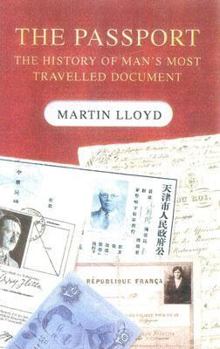The Passport: The History of Man's Most Travelled Document
Select Format
Select Condition 
Book Overview
Have you ever wondered how a passport works and what happens when it doesn't? Well, in this well illustrated book this and many other questions are answered as the story of the passport is told for... This description may be from another edition of this product.
Format:Hardcover
Language:English
ISBN:0750929642
ISBN13:9780750929646
Release Date:January 2003
Publisher:Sutton Publishing
Length:282 Pages
Weight:1.12 lbs.
Dimensions:0.9" x 6.3" x 8.0"
Customer Reviews
3 ratings
A Great Read
Published by Thriftbooks.com User , 17 years ago
This is a terrific book. It details the origins of the passport, how it developed from an informal travel document to the modern entity we know of today. There are some stories and some topics I would have liked to have seen discussed at more length, but overall an excellent and entertaining book.
Good overview of what passports are and where they came from
Published by Thriftbooks.com User , 18 years ago
Martin Lloyd does a good job in this book of telling the story of the passport. He uses a fair number of illustrative stories to show how international incidents could come about (an assassination attempt on Napoleon III, for instance) because of passport rules (in that case, passports could be issued by one nation to another's citizens at that time). The book kept my interest throughout, and it includes illustrative pictures of passports and similar documents. The author is very conversational, occasionally letting his viewpoint come through but in a non-irritating way. It is interesting contemplating being a customs officer before passports were at least somewhat standardized. It's hard enough NOW to determine their authenticity!
The Amazing History of a Traveler's Everyday Companion
Published by Thriftbooks.com User , 21 years ago
Every now and then an expert in a field will produce about it a guide for laymen, a book to introduce aspects of his life's work to others. One might not expect much from Martin Lloyd, who spent 23 years in Her Majesty's Immigration Service, especially since as author he has confined himself to one little part of his job. In _The Passport: The History of Man's Most Travelled Document_ (Sutton), however, Lloyd has made uniquely interesting a document that most travelers just take for granted. From the paper it is printed on to its cover, and from cuneiform to optical scanner recognition, the passport is all here. This is just the book to give to someone racking up international frequent flier miles.It is surprising how unsubstantial a passport is in legal terms, and how much it has changed in the centuries. International law, amazingly, has nothing to say about the rights of those with or without passports. Passports themselves were originally a sort of letter of introduction, but then monarchs became established and realized that it was useful to have some sort of control of who was leaving or entering one's realm. Even this was not given much legal weight. A more-or-less organized passport system has been in place for three centuries, but before the First World War, one could travel to most of the world without one; a passport was "in most cases a facility or a politeness, not a requirement." Internationalizing passports has presented problems, many of which have no good solution. It was difficult, once passport booklets had become the standard and once typewriters were universal, to develop a way to type into the booklet without breaking the spine. Worse, it was often hard to tell what was the front of a passport; Lloyd may be writing from his own experience when he explains that puzzled passport control officers would try to remember whether a certain nation's passports opened at the front, the back, were read sideways, and if so, which way sideways. International Civil Aviation Organization organizes passports, and has decreed, for the sake of civil rights, that passports not have a magnetic strip; that would make using them easier, but it might also encode information about the bearer. Lloyd has included a host of interesting anecdotes about passports through history. William Joyce, for instance, was famous as Lord Haw Haw, the broadcaster of Nazi propaganda. He was obviously a traitor, but he was born an American and had become German, and had never been British. He was captured by the British, and accused of treason, but it is not logical that Britons could try a non-Briton for such a thing. Joyce happened, however, to have gotten illegally a British passport, and this was enough eventually to hang him. In 1953, an American named Davis declared himself a citizen of the world, and made his own passports under the auspices of the World Service Authority, a "fictional organization"; the document was mistakenly endorsed as r





